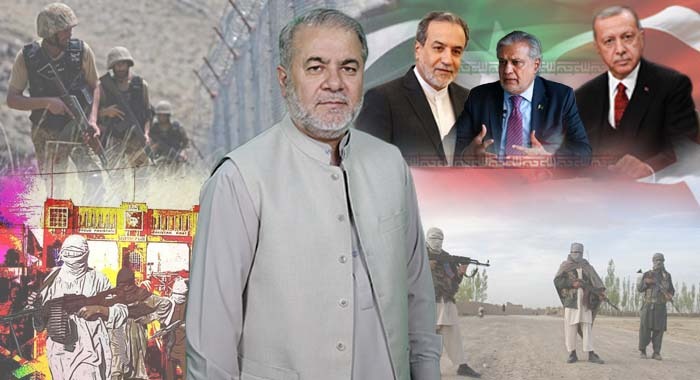Pakistan and Afghanistan have long faced challenges stemming from cross-border militancy and unresolved disputes, and recent efforts by regional players such as Iran and Turkey demonstrate that dialogue remains essential. Iran’s Foreign Minister, Abbas Araghchi, has held phone discussions with Pakistan’s Foreign Minister Ishaq Dar and Afghanistan’s Foreign Minister Amir Khan Muttaqi, aiming to bridge differences and reduce tensions between the neighbouring countries. Complementing this, Turkey plans to send a three-member delegation to Pakistan, reflecting its active role in regional diplomacy.
While previous rounds of negotiations in Doha and Istanbul failed to yield lasting solutions, the continuation of these efforts signals a willingness among neighbours to mediate. The recent engagement by Turkey and Iran, including face-to-face discussions between Pakistani and Afghan leadership, illustrates that constructive dialogue can still take place. Agreements were reached on several issues, but the persistent challenge of terrorism in Pakistan remained a major sticking point.
Pakistan has consistently maintained that the leadership of the Pakistani Taliban (TTP) and certain Baloch militant groups operates from Afghan soil. While the Afghan government historically dismissed these claims as Pakistan’s internal matter, off-the-record acknowledgements suggest the Afghan Taliban are aware of the presence of these militants. However, reluctance to formalise these acknowledgements in written agreements has hindered progress. Pakistan proposed measures to address Afghanistan’s border and trade concerns, contingent on a commitment from the Afghan Taliban to ensure a substantial reduction in cross-border terrorism. This condition was not met in formal agreements, resulting in protracted negotiations.
The escalation of provocative statements from both sides following failed talks is particularly dangerous. Some Pakistani journalists and commentators have irresponsibly suggested military action against Afghanistan, while certain Afghan interim ministers have issued public statements undermining bilateral relations. Such conduct, especially from officials, constitutes policy statements with significant repercussions and should be discouraged.
Iran’s mediation proposal and Turkey’s upcoming delegation, which includes senior officials such as the defence minister, intelligence chief, and foreign minister, offer a renewed opportunity to engage both Pakistan and the Afghan Taliban. If these efforts continue, there is potential for meaningful dialogue and tangible progress.
Beyond regional diplomacy, China also has a vested interest in stability, given its extensive investments in the region. Unresolved security issues between Pakistan and Afghanistan pose risks to these investments, making China a key stakeholder. However, various actors with competing interests may not wish to see peace achieved, as regional trade and connectivity could shift the balance of influence. The success of negotiations depends not only on Pakistan’s commitment to its interests but also on the Afghan government’s willingness to assume responsibility and govern Afghanistan as a functional state rather than a closed ideological enclave.
The Afghan Taliban’s domestic policies, including restrictions on women’s education and employment, continue to draw international attention, highlighting the broader context in which these negotiations occur. Despite these challenges, Pakistan has consistently pursued peace, avoiding inflammatory rhetoric against Afghanistan. Yet, frustration arises when Afghan Taliban officials, many of whom were born, educated, and militarily active in Pakistan, make daily statements against Pakistan, undermining bilateral trust.
The Afghan Taliban have attempted to manage the TTP presence by initially mediating negotiations with Pakistan, facilitating dialogue with Pakistani delegations, and monitoring training centers for suicide attackers. During periods when these measures were effectively implemented, bilateral trade increased, and terrorist incidents in Pakistan decreased. These developments underscore a critical point: if the Afghan Taliban demonstrate political will and authority, cross-border terrorism can be significantly curtailed.
Furthermore, evidence shows that Afghan nationals and militants, including those within the TTP, have been directly involved in attacks against Pakistan’s security forces. Letters from Afghan intelligence directing border infiltration by TTP members reinforce Pakistan’s claims that militants in Afghanistan are orchestrating attacks across the border. While some Afghan Taliban factions recognise the destabilising impact of these militants and maintain concerns about Pakistan’s influence and investment, the overarching leadership possesses the capacity to control or restrain these elements.
In conclusion, the resolution of Pakistan-Afghanistan security challenges hinges on both regional diplomacy and the internal cohesion of the Afghan Taliban. Historical precedents show that when properly engaged, the Taliban can exercise influence to reduce cross-border militancy. The responsibility lies with Afghanistan’s current leadership to exercise that authority decisively. If the Afghan Taliban choose to act, terrorism in Pakistan can be significantly reduced, demonstrating that regional stability is achievable with concerted political will and sustained dialogue.





